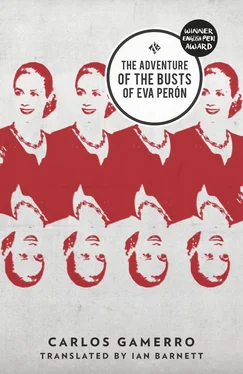‘Where did you get them?’
‘Soon as news got out that Perón had thrown in the towel, Rodolfo and I grabbed our old banger of a pick-up — the same one parked out there — and started doing the rounds. Because it wasn’t just the government; the civilian commandos didn’t hang around: wherever they saw a portrait, a statue or a bust that bore even the slightest resemblance to Eva or Perón, they’d hack it down, knock it over, send it rolling across the floor. That day, right here in Ciudad Evita, we saved every one we could: the one in the school, the one in the square, the one in the sports centre. Then we started getting tip-offs: the girls from a textile factory had been hiding one for months… another one at a cold-storage plant, a library, the baggage handlers at Ezeiza… Each and every one of these Evas and Juans you can see has a history; feats of heroism great and small were needed for them to get as far as this; as you well know, you could spend months in jail if you were caught — just for having a photo or a picture of them in your house.
Marroné had started roaming around the improvised gallery: not even in the Louvre or the Uffizi had he felt anything remotely similar. The busts were all cleaned and shined and polished: clearly any devotion to cleanliness and order that Rodolfo might have had in him he lavished on his cherished collection, and had nothing left for his own life. He had them all facing the window so that they could entertain themselves day and night with contemplating the beauties of the Peronist citadel. And there they had been all along, waiting for him to collect the codes and solve the riddle. Where else could they have been? Here, right at the heart of the bun. He should have known. But of course, you can’t reach the heart of the maze without roaming its passageways first.
‘Nineteen years they’ve been waiting for the General to return. Almost all of them have their provenance noted down,’ said Rodolfo proudly.
He turned over a small black Eva for Marroné to read the yellowing piece of paper stuck on the base: WOMEN’S PP BASIC UNIT — P PERÓN DISTRICT. Then — with both hands — a larger one, in cement: BERAZATEGUI WORKERS’ DISTRICT — SQUARE. And another, in bronze: GAS WORKERS’ UNION — BA PROVINCE. And another: AVELLANEDA HOSPITAL — ENTRANCE.
‘The idea was to put each one back in its original place,’ Don Rogelio explained.
‘Still is,’ declared Rodolfo categorically.
‘We can talk about that later,’ said Don Rogelio, with a wink at Marroné.
But Rodolfo seemed determined to take a stand:
‘When he did eventually come back, I wrote him a letter. Then another, in case the first had got lost. Then another, and another. I gave up in the end.’
‘I told you, Rodolfo, the General never got them. All his correspondence was being screened.’
Rodolfo stared at his friend through black orbs of bitterness.
‘He read them and used them to wipe his arse on is what I reckon. The Perón that came back wasn’t our Perón any more. They did something to him, López Rega and that whore of a wife of his. Anyway, makes no difference now. He’s dead and gone. Who are we going to give them to now? There’s nobody left as deserves them.’
He finished speaking and gave Marroné a flinty glance — the first. It was but an instant, yet it spoke volumes. He had caught in Rodolfo’s eyes the fiery glint of fanaticism and the insane possessiveness of the collector; and if Rodolfo had seen something similar in his — if he had read how he felt, that is — they stood as much chance of coming to an agreement over Eva’s busts as Paris and Menelaus over Helen.
They arranged a little asado for the same night, at Don Rogelio’s — just the three of them. In the violet twilight, with the first star hanging motionless in the sky and the first moth throwing itself headlong at the naked light bulb that hung over the grill, Don Rogelio told him his friend’s story while building the pyre of screwed-up newspaper, kindling and charcoal to start the fire. Marroné found it hard to follow, as he was busy making a mental inventory of the busts he’d seen, classifying them by colour, material, style and size — he had to choose them carefully: he didn’t want the office turning into a junk shop, after all — and only caught the odd word here and there.
‘Action in the square… the military… Perón… angry at the Church… to defend… several were armed…’
‘Huh? To defend the churches?’
‘It was us as torched the churches, Ernesto.’
‘Oh. Sorry.’
‘But that was later. I was telling you about the bombardment of Plaza de Mayo. Most went along like any other day… in ten years we’d gone soft and let our guards down. They sent the planes in early. Rodolfo had gone with his wife, and they spent the time walking round and round the city centre, which was chaos, not knowing what to do. By the afternoon, when the leaders of the uprising had surrendered, they approached the square, to see if they could do anything to help. They got there just as the last wave came in — the worst. Rodolfo had a bit of luck, good or bad depending on how you look at it: he was only wounded in the leg. But his wife… She was six months pregnant at the time. He was very bitter. Wouldn’t come to our house while my wife was alive. We used to meet up outside, in the houses we’d hole up in, or when we pulled off the occasional act of sabotage together…’
Marroné was outwardly calm, making the appropriate signs of dismay or distress whenever the springs of the story seemed to require it; but inwardly he was a ferret, incapable of keeping still for a moment, sniffing about for the entrance to the rabbit warren. While providing him with some useful information on his rival and his potential weaknesses, Don Rogelio’s account only confirmed his initial fears about Rodolfo: the man was obsessed, a madman shackled to a trauma for life; it was going to be very tough, not to say downright impossible, to tear the Evas from his clutches. His evaluation was confirmed in the first phase of the asado , when, between mouthfuls of sausage and black pudding, Don Rogelio invited him to tell his friend the truth of the matter. Marroné gave his table companions a watered-down version they could swallow, highlighting the involvement of ‘the company’ (he’d decided not to name it just in case) in the building of new schools, hospitals, union hotels, the Children’s Republic (a tactical strike) and the plans for the Monument to the Descamisado during the first Peronist government.
‘So your boss is a Peronist, is he?’ asked Rodolfo, still frowning suspiciously.
‘Of the first water,’ Marroné asserted categorically. ‘Believe it or not, he arrived in the country on 17th October 1945 and was the first to dip his feet in the fountain. His father was a frequent guest of Eva and the General’s, and he met them himself as a very young man at the Residence.’
‘So why’s he been kidnapped by the Montoneros?’
‘That one’s too easy,’ thought Marroné, ‘he’s handed it to me on a plate.’
‘Correct me if I’m wrong, but… I was under the impression that the hallmark of all true Peronists was the way they go around bumping each other off.’
Rodolfo and Don Rogelio exchanged glances of truco partners facing the ace of swords.
‘What did you say his name was?’
He hadn’t, of course, deliberately.
‘Fa… Fausto Tamerlán,’ he said, bracing himself for the shock wave.
‘Tamerlán? The one from the construction company?’ spluttered Rodolfo in outrage. ‘He’s a bigger gorilla than King Kong that one is. My nephew was a union delegate on a building site and the security guards beat the crap out of them.’
Читать дальше











